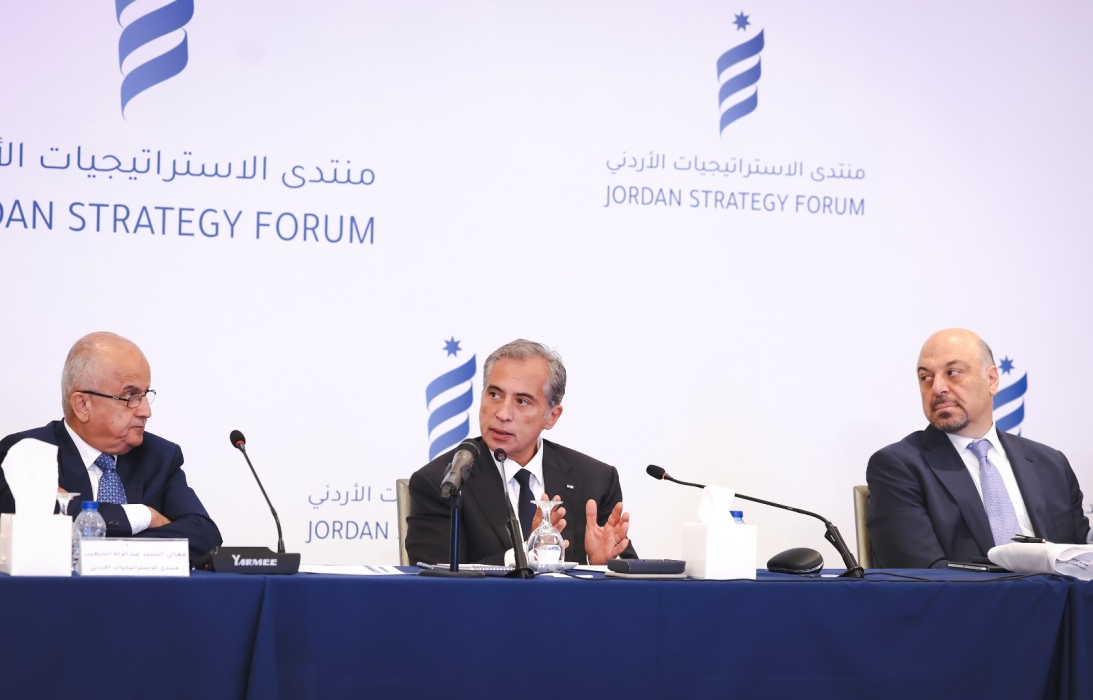- Local News
- Sun-2024-11-10 | 11:14 pm

Nayrouz News Agency :
Prime Minister Jaafar Hassan told investors and economists on Sunday that the economic modernisation vision has been collectively developed and will be implemented in a participatory approach.
In a dialogue session with investors and economists organised by the Jordan Strategy Forum, Hassan said his government is committed to working with the private sector to realise the economic modernisation vision.
"We are united in one project. We have all contributed to its formulation and will accomplish it together," Hassan said. He added that the government would work with a clear timetable, setting specific priorities and goals. "Every day counts as we move forward."
Hassan acknowledged the difficulties posed by ongoing regional and global uncertainties. "The challenges we are dealing with are not new; we have faced more severe challenges in recent years. We remain committed to doubling our efforts because overcoming these challenges requires everyone to be fully involved."
He outlined two primary strategic priorities: increasing investment to create economic and employment opportunities and reducing the costs of servicing external debt in the medium term.
Hassan discussed promising opportunities for economic growth, citing key infrastructure projects such as the national carrier and the national railway project, which will link Aqaba to Ma'an and the southern Dead Sea.
"These projects are funded by foreign investment and are available for local investors to become key partners in their success," Hassan said, adding that other large-scale infrastructure projects are also in the works.
On energy, Hassan noted plans to develop the gas and alternative energy sectors, anticipating that the electricity demand will increase by over 30% in the next six years, adding that the government is working on expanding industry and export funds, especially in the food industries.
The Prime Minister said there are "great" opportunities to expand Jordan's service exports, particularly in the information technology sector.
On the business environment, he said the government is digitising and removing administrative obstacles for citizens and investors. He revealed that several projects aimed at enhancing digital services would be completed within the next two years.
On the public sector modernisation efforts, Hassan explained that new rules and instructions are being developed to ensure qualitative improvements in public service.
Forum Vice Chairman Karim Kawar praised the government for taking "swift and necessary," signalling positive messages to the private sector and enhancing the national economy's competitiveness.
Forum Executive Director Nisreen Barakat announced the launch of an interactive economic indicators dashboard, which will be available on the Forum's website. The dashboard will cover five main sectors and include 90 sub-indicators related to economic, social, financial and monetary trends.
Abdul-Ilah Al-Khatib, former Chairman of the Forum's Administrative Board, noted that this dialogue session marked the first time the current government had engaged directly with the private sector.
In a dialogue session with investors and economists organised by the Jordan Strategy Forum, Hassan said his government is committed to working with the private sector to realise the economic modernisation vision.
"We are united in one project. We have all contributed to its formulation and will accomplish it together," Hassan said. He added that the government would work with a clear timetable, setting specific priorities and goals. "Every day counts as we move forward."
Hassan acknowledged the difficulties posed by ongoing regional and global uncertainties. "The challenges we are dealing with are not new; we have faced more severe challenges in recent years. We remain committed to doubling our efforts because overcoming these challenges requires everyone to be fully involved."
He outlined two primary strategic priorities: increasing investment to create economic and employment opportunities and reducing the costs of servicing external debt in the medium term.
Hassan discussed promising opportunities for economic growth, citing key infrastructure projects such as the national carrier and the national railway project, which will link Aqaba to Ma'an and the southern Dead Sea.
"These projects are funded by foreign investment and are available for local investors to become key partners in their success," Hassan said, adding that other large-scale infrastructure projects are also in the works.
On energy, Hassan noted plans to develop the gas and alternative energy sectors, anticipating that the electricity demand will increase by over 30% in the next six years, adding that the government is working on expanding industry and export funds, especially in the food industries.
The Prime Minister said there are "great" opportunities to expand Jordan's service exports, particularly in the information technology sector.
On the business environment, he said the government is digitising and removing administrative obstacles for citizens and investors. He revealed that several projects aimed at enhancing digital services would be completed within the next two years.
On the public sector modernisation efforts, Hassan explained that new rules and instructions are being developed to ensure qualitative improvements in public service.
Forum Vice Chairman Karim Kawar praised the government for taking "swift and necessary," signalling positive messages to the private sector and enhancing the national economy's competitiveness.
Forum Executive Director Nisreen Barakat announced the launch of an interactive economic indicators dashboard, which will be available on the Forum's website. The dashboard will cover five main sectors and include 90 sub-indicators related to economic, social, financial and monetary trends.
Abdul-Ilah Al-Khatib, former Chairman of the Forum's Administrative Board, noted that this dialogue session marked the first time the current government had engaged directly with the private sector.









